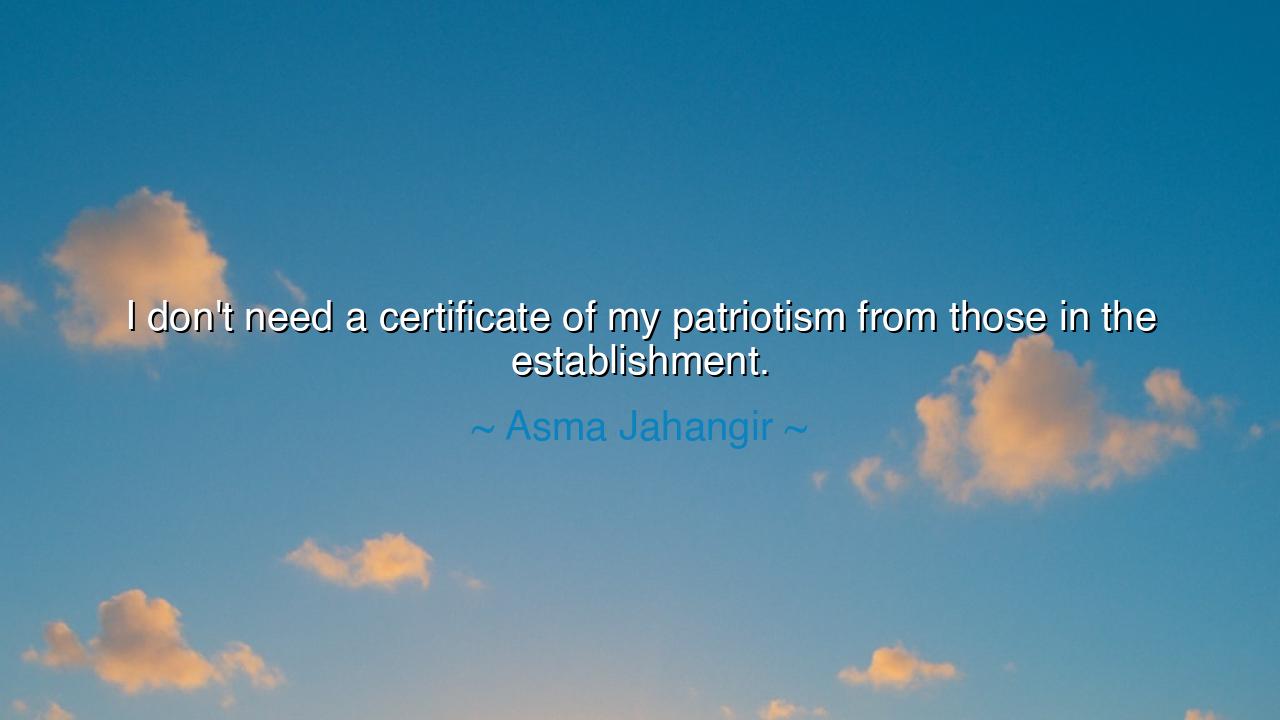
I don't need a certificate of my patriotism from those in the






“I don’t need a certificate of my patriotism from those in the establishment.” With these fiery words, Asma Jahangir, the fearless defender of justice, spoke truth not only for her time, but for all times. Her declaration resounds like the strike of a great gong in the halls of history: that the measure of loyalty to one’s homeland is not stamped upon paper, nor granted by rulers, nor bestowed by the mighty. True patriotism is written upon the soul, forged in the furnace of conscience, and proven in the deeds of courage one undertakes for the good of the people.
The establishment, with its powers and privileges, often seeks to dictate who is loyal and who is not. They weave a web of decrees and labels, granting approval to those who bow, and condemning as traitors those who resist. But Jahangir, with her unyielding voice, tore apart such falsehood. She stood for the truth that patriotism is not obedience to authority, but fidelity to the higher principles of justice, dignity, and freedom. To love one’s land is to guard its people, to protect the weak, and to raise one’s voice when silence would be betrayal.
History bears witness to this truth. Recall Socrates in ancient Athens, who stood accused of corrupting the youth and dishonoring the gods. The establishment branded him an enemy of the city, yet his entire life had been spent in pursuit of wisdom and virtue for the betterment of Athens itself. He refused exile, drank the hemlock, and in so doing, showed that loyalty to truth and integrity outweighs even life. His patriotism was not recognized by the rulers of his day, but it shines immortal in the memory of mankind.
So too with Nelson Mandela, who was imprisoned for twenty-seven years by the very government that claimed to guard South Africa. They called him a criminal, an enemy of the state, a traitor to their imposed order. Yet, in truth, his heart beat with the deepest patriotism—a devotion to his people’s freedom and dignity. When the chains were finally broken, the world saw what the establishment could not: that his long suffering had been the purest proof of love for his land.
Thus, the lesson is clear: never let the judgments of the powerful define your loyalty to truth. To accept their “certificate” of patriotism is to surrender your conscience into their keeping. Instead, let your actions bear witness. Stand for the voiceless. Defend justice even when it is dangerous. Question authority when it strays from righteousness. For it is not the favor of rulers that determines your worth, but the alignment of your heart with truth.
For those who listen and seek guidance, let this teaching sink deep: be courageous when the establishment calls you disloyal for questioning their corruption. Be steadfast when you are maligned for protecting the oppressed. Be fearless when you must stand alone. True patriotism is not the applause of the powerful, but the silent strength of one who dares to do right when all others shrink away.
Therefore, in your own life, take up this practice: do not measure yourself by the certificates others grant. Instead, look inward. Ask yourself daily, “Have I acted with justice? Have I defended what is noble? Have I honored my people by living with integrity?” If the answer is yes, then you need no recognition from kings, presidents, or councils. You are already a patriot, crowned not with parchment, but with the eternal seal of truth.
And so Asma Jahangir’s words endure as a torch passed down: let no establishment define your heart. Your patriotism is yours to live, yours to guard, and yours to prove—not in documents, not in decrees, but in the courage of your every deed.






AAdministratorAdministrator
Welcome, honored guests. Please leave a comment, we will respond soon